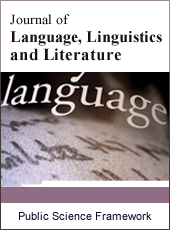Journal of Language, Linguistics and Literature
Articles Information
Journal of Language, Linguistics and Literature, Vol.1, No.2, Apr. 2015, Pub. Date: Mar. 31, 2015
Criminal and Anti-Social Behaviors Inherent in Ekpo Festival Among Ibibio of Nigeria: A Call for Cultural Reformation
Pages: 12-18 Views: 10081 Downloads: 4286
[01]
Ojo Matthias Olufemi Dada, Department of Sociology, Crawford University of the Apostolic Faith Mission, Igbesa, Ogun State, Nigeria.
[02]
Ayodele Abel Olurotimi, General Studies Unit, Crawford University of the Apostolic Faith Mission, Igbesa, Ogun State, Nigeria.
This paper examined the Ekpo festival among Ibibio of Akwa Ibom State, Nigeria. Survey method was used in the research conducted and the study areas were: Ituk Mbang, Ndon Uruan and Ikono Obio in Uruan Local Government Area and Ikot Udo in Ibeskipo Local Government Area all in Akwa Ibom State, Nigeria. Six respondents were sampled using convenience sampling under non-probability sampling technique. In-depth interviews were conducted as sources of data collection and soft data in form of photographs were also used. The data from in-depth interviews and photographs were analyzed using content analyses. The study investigated the processes involved in the initiation into Ekpo cult and the stages involved during the Ekpo festival were discussed. The functions of Ekpo cult (through Ekpo festival) in entertainment, settlement of disputes and social control were mentioned as the prominent functions of Ekpo cult. The study discovered that malicious damage of farm crops and livestock animals, forceful initiation, beating of women and girls, keeping non-initiates, women and children indoor during the festival, economic retardedness during the festival and fearful looking masks were the criminal and anti-social behaviors exhibited during the Ekpo festival. The paper recommended that Akwa Ibom State should legislate against exhibition of criminal and anti-social behaviors during Ekpo festival and other festivals within the state. State government should re-organize the festival in such a way that it would attract people from other states and outside Nigeria to boost the revenue of the state government and increase the economic gains of the Akwa Ibom State people. Community leaders were equally implored to preach against criminal and anti-social behaviors during this festival, using Christianity and western education as potential tools. These are calls for cultural reformation.
Ekpo Cult, Ekpo Festival, Initiates, Masks and Akwa Ibom
[01]
Adler, Emily Stier and Clarks Roger (1999). How it is Done: An Invitation to Social Research. Canada: Wadsworth Publishing Company.
[02]
Abiaka, Blessing (2004). Naked Gods: Africa the Land of Culture. Retrieved from www.google.com on 12/10/2014.
[03]
Akpan, Joseph (1994). Ekpo Society Masks of the Ibibio. African Arts, 27 (4): 48 – 53.
[04]
Auta, Filibus Jamaka (2013). Systemic Population and Family Education for National Security and Development. Journal of Education and Social Research, 3 (5): 135 – 143.
[05]
Clark – Ekong, Sheilah F. (1997). Traditional Festivals in the Political Economy: The Case of Contemporary Ghana. Journal of Social Development in Africa, 12 (2): 49 – 60.
[06]
Ekpotu, Patrick (2009). Our Culture, Our Thoughts and Errand Acculturations. A lecture delivered at Cultural festival Weekend of the African Thought and cultural society of St. Joseph Major Seminary, Ikot – Ekpene, on 18th January.
[07]
Ganyi, Fracis Mowang; Inyabri, Idom T and Okpiliya, James O. (2013). Performance Aesthetics and Functionalism: The Legacy of Atam Masquerade of the Bakor people of Ogoja Local Government Area. International Journal of Humanities and Social Science Invention, 2(10): 50 – 62.
[08]
Ikoh, Moses U and Charles, Joseph. O. (2010). Socio – cultural Determinants of Criminal and Anti – Social Behaviour of Agaba Groups in Calabar Metropolis, Nigeria. Internet Journal of Criminology: 1 – 21. Retrieved from www.internetjournal of criminology.com on14/11/2014.
[09]
Ikuomola, Adediran Daniel; Okunola, Rashidi Akani and Akindutire, Adeshina, Francis (2014). Ritualised (DIS) Order: Street Carnivals, Transgressions and Excesses in Nigeria. Antropologija, 14(1): 129 – 146.
[10]
Johnson, Janet Buttolph; Josiyn, Richard A. and Reynolds H. T. (2001). Political Science Research Methods (Fourth Edition). USA: C Q Press.
[11]
Neuman, W. Lawrence (2003). Social Research Methods: Qualitative and Quantitative Approcahes 5th edition. USA: A and B Company.
[12]
Nicholls, Robert W. (1997). Folk Media. Folklore Forum, 28 (1) 49 – 82.
[13]
Nevadonmsky, Joseph (1993). The Benin Kingdom: Rituals of Kingship and their Social Meanings. African Study Monographs, 14 (2): 65 – 77.
[14]
Nyiaana, Kialee (2011). From University Campuses to Villages: A study of Grassroots – based Cult Violence in Ogoni land. ERAS, 12 (2): 1 – 35.
[15]
Obuh, Stanley O. S. (2005). The Paradox of Masks: A call for the Return to Masking Aesthetics in Contemporary Nigeria Theatre. Retrieved from www.bu.ac on 10/11/2014.
[16]
Schutt, Russell K (2004). Investigating the Social World – The process and practice of Research 14th Edition. USA: Pine Forge Press.
[17]
Udo, Edet A. (1983). Who are the Ibibio? Onitsha, Nigeria: Africana Feb Publisher Limited.
[18]
Umoh, Dominic (2011). The Reality Behind the Mask in “Ekpo – Ikpaisong” in Annang culture of Akwa Ibom State, Nigeria. Journal of Communication and Culture: International perspective, 2 (1): 101 – 108.

ISSN Print: 2381-7054
ISSN Online: 2381-7062
Current Issue:
Vol. 6, Issue 1, March Submit a Manuscript Join Editorial Board Join Reviewer Team
ISSN Online: 2381-7062
Current Issue:
Vol. 6, Issue 1, March Submit a Manuscript Join Editorial Board Join Reviewer Team
| About This Journal |
| All Issues |
| Open Access |
| Indexing |
| Payment Information |
| Author Guidelines |
| Review Process |
| Publication Ethics |
| Editorial Board |
| Peer Reviewers |


